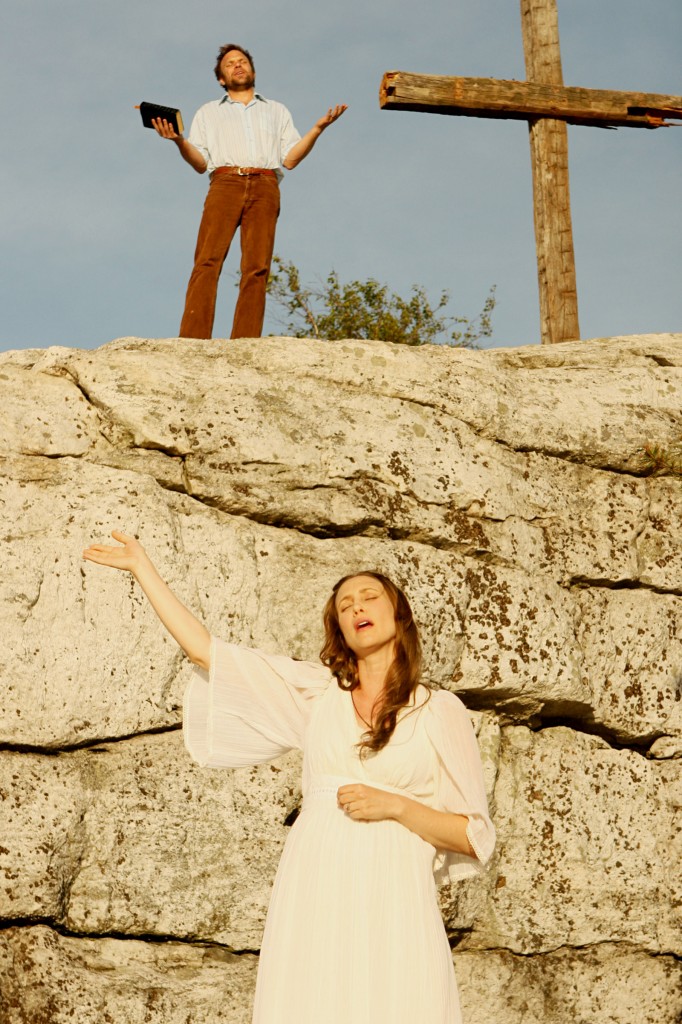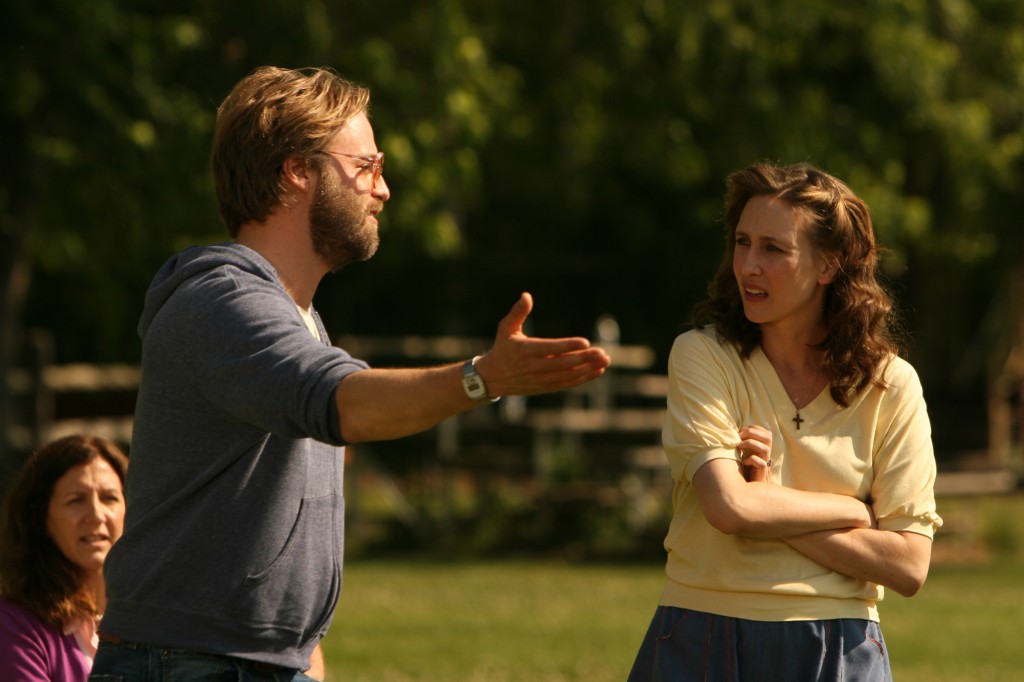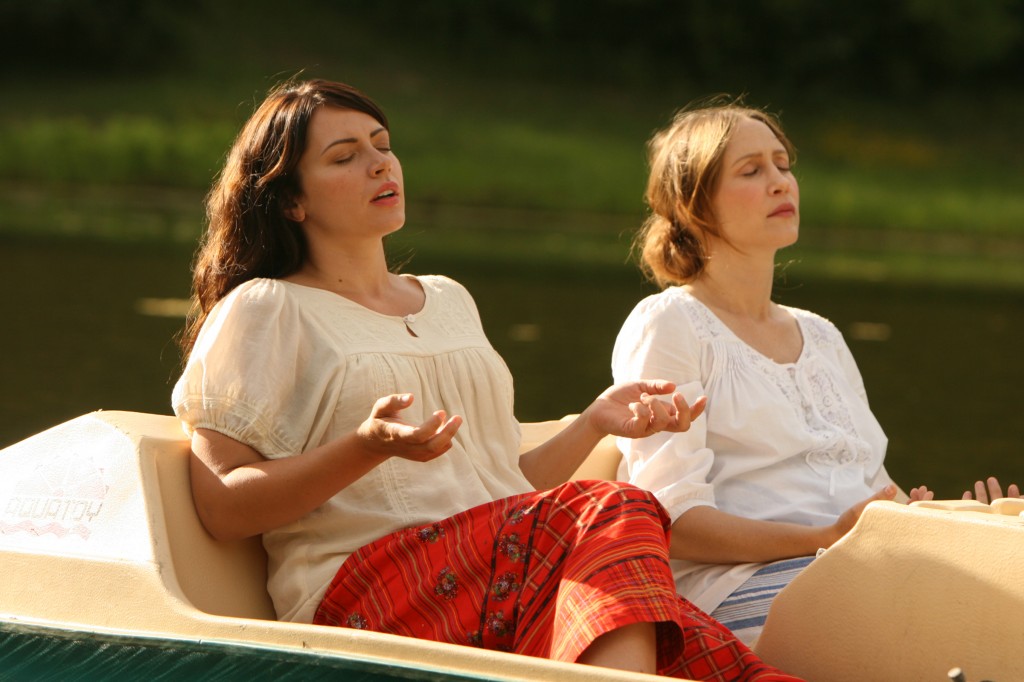Yet again, one of the best films of the year will not get the extensive release and wider attention that it deserves. Vera Farmiga’s Higher Ground wrestles with conservative, evangelical Christianity…certainly not the subject of choice for most first-time directors. The result is a deeply moving and emotional film that takes its place as one of the best films about religion ever made.
Higher Ground traces the journey of Corinne, played at various stages of aging by McKenzie Turner, Taissa Farmiga (Vera’s younger sister), and finally Vera Farmiga. As a young girl she attends church, but it only seems to be a safe option to keep her out of her mother’s, Kathleen (Donna Murphy), hair. Things at home are a bit complex. Her father, CW (John Hawkes) and mother seem to be in love with one another, but as the years pass, they grow further and further apart. Kathleen, more of the free spirit, seems to feel hemmed in by CW, something of a homebody. Corinne’s a bit of an outsider at school. Quiet and introverted, she wants to be a writer. Her sister, a bit of a rebel, ridicules her when the school’s cool guitarist, Ethan (Joshua Leonard), falls in love with her. Corinne and Ethan date, get pregnant and then get married. After a car accident that nearly claims the life of their first daughter, they turn their lives over to Jesus and join a highly conservative, evangelical Christian community. Their membership in the community quickly begins to define their lives, individually, as a couple, and as a family. The film focuses on their marriage and their (in)ability to negotiate their faith with the rest of their life. Feeling spiritually, emotionally, physically, and intellectually oppressed by the community to which she belongs, Corinne begins pushing against the leadership and must decide whether or not she will remain in it.
The film benefits from nearly flawless direction by Farmiga and picture perfect performances from lead actors to supporting cast. The cinematography harkens back to the independent religious productions of the ’60s and ’70s, basically summed up by the still below. There’s not a great chance that Higher Ground will play beyond larger cities, so most viewers will need to seek it out on DVD when it releases later this year. From religious, theological, or spiritual perspectives there are nearly countless avenues through which to discuss the film. Richard Lindsay and I highlight a few below.

Ryan: I think we have what will be one of the best religious films of the decade. Both Farmiga’s direction and performance has catapulted this film into rarefied religious cinema air alongside the likes of none other than Robert Duval’s The Apostle. Farmiga treats the delicate subject matter with a sense of realism that mirrors Duval’s approach to Pentecostalism. There will, no doubt, be some viewers who feel like Farmiga is attacking religion here, but I think she’s up to something much more complex. There’s a sincerity here that makes cynicism all but impossible to creep into the film. Ultimately, I think what Farmiga is critical of, and rightfully so, is the vacuity of a particular approach to faith/religion. I know you also have a particular take on this, regarding the inability of a “Jesus, Jesus, Jesus” mentality to connect with experiences outside of that community of faith.
Richard: The film had particular resonance for me in its portrayal of the charismatic Christian movement of the 70’s, which, although it took a much less radical form in my family than it did in the movie, was where my faith was incubated. I was one of those kids in the movie singing happy-clappy Jesus songs while my mom went to the women’s fellowship Aglow and my dad went to Full Gospel Business Men’s meetings. They also had the religious instructional tapes (although thankfully a lot less graphic than the evangelical sex instruction tapes in the movie) and groovy versions of the bible like the Good News Bible and The Way. I particularly liked the characters’ discussion of earthquakes in California being a direct result of the state’s immorality—as embodied by the gay rights movement, the dregs of the hippies, and alternative religious practices. This discussion actually took place in my family, although to their credit, my parents didn’t put much stock in the theory.
The film does an excellent job capturing elements of the culture which emerged out of the Jesus People movement of the late 60’s. The Jesus People combined the radical experiential practices of the hippies with evangelical Christianity. They saw no innate conflict between living as hippies in upstate New York, eating 70’s health food, talking graphically about having meaningful sex with their spouses, and then going to prayer meetings at house churches. Jesus was their drug.
Two notable cultural items the film missed: it didn’t mention the apocalyptic “prophecy” book, possibly the underground bestseller of the 70’s, The Late Great Planet Earth by Hal Lindsay. It would be almost impossible to portray charismatic Christianity in this era without at least mentioning it. Also, most of the songs they sang in church meetings were traditional gospel songs. The contemporary Christian music industry is the major legacy of the Jesus People movement, and I was expecting them to bust out some songs from the “Sing N’ Celebrate” collection, like “Love is the Flag Flown High (From the Castle of My Heart).” It may have been copyright issues that limited their use.
Much of my confusion around religion as a child had to do with the demands placed on people who were charismatics, but who didn’t withdraw from the world to the extent the characters did in the film. Fortunately, although my parents were dedicated, perhaps even fixated, on our Christian formation as kids, they judged that our spiritual growth would not be hampered by Star Wars, Johnny Cash, and The Electric Company. But this kind of faith is quite literally totalitarian, in that it demands the commitment of the whole individual. If you’re having a good day, it’s because God has blessed you, if you’re having a bad day, it’s because Satan is testing you. I could never integrate the intensity of a Sunday night healing service, in which we were said to be doing spiritual warfare with the Devil, who was literally causing all of our physical and mental afflictions, and the everyday world of being a kid. How could I go to school on Monday morning and think everything was normal? Didn’t my friends (most of whom were blithely Catholic) see the cosmic conflict all around them?

As I discovered as I got older, to say “Jesus is the answer” does not mean you don’t have physical limitations, that you don’t have very human desires, or that you don’t have to get to know your own mental geography through counseling and self-reflection. The violence seething under the surface of Corinne’s husband in the film, the sexual repression of her church community, and the frustration she felt at not being able to explore secular literature and art seem part and parcel of a kind of religion that places the focus “all on Jesus” and none on our own experience as human beings.
Ryan: I think you’re right about the “all or nothing” approach to Jesus in this community. I felt that one of the strengths of the Vergara’s direction and performance was her ability to convey that sense of being smothered…of not having a creative or intellectual outlet. There are numerous times throughout the film where Corrine takes a deep breath or throws her head back or rolls her eyes as if to push back against this pressure. I often felt like I was being pushed down on her as she struggled to make space for herself.
As Corinne begins to struggle with the faith of the community and, more specifically, her husband, the two begin to grow apart. The two go see a marriage counselor and it’s clear who he thinks is the problem. As he begins to “counsel” Corinne, he tells her that he is fighting for her soul. He warns her, “There’s a lake of fire waiting for you with whips that will tear your flesh.” Corinne rapidly responds, “Will you be watching?” This is one of the sharpest, most incisive lines of dialogue you’re likely to find in films like this. I think this epitomizes the us vs. them mentality of some forms of conservative evangelicalism. I wonder if it’s not also part of the controversy surrounding Rob Bell’s latest book, Love Wins, and his departure from Mars Hill. Some Christians seem to feel offended by or afraid of Bell’s pronouncement that hell might not be as we’ve traditionally defined it or, eventually, empty. Rather than cheering the unconditional, unending love of God, they ridicule Bell’s dismissal of “basic Biblical principles,” as if those are so easily defined. Bell’s vision of life beyond this one threatens to rob many Christians of the basic human desire for revenge and just desserts…one, of course, that God calls us to rise above.
Richard: There’s a major interest in many evangelical communities at seeing those who don’t agree with them getting their comeuppance. It’s one of the most un-Christian tendencies in American Protestantism. The whole system is also shot through with the sexism presented in the film. And Mainline Protestantism has not yet exorcised these demons, either.
Ryan: In another shining example of Christian love, one of the members of the community tells Corinne that, basically, if she doesn’t get right with God, she’ll be left outside with the dogs. This is a powerful line with at least one significant biblical reference (Matthew 15:22-28). Later in the film, there’s a scene in which Corinne returns to the church of her youth in the midst of a crisis of faith. In one particular shot, we see over her shoulder to the front porch of the church where a large dog moves into the scene. When she walks back out of the church and follows the dog to an adjoining field, several other dogs rush around her. This is a brief but effective scene. It is, of course, a reference to the comment that she’ll be left outside with the dogs. Of course what her fellow Christian probably did not know is that dogs are symbols of fidelity. Throughout art history, and specifically in religious paintings, the presence of dogs often signified faithfulness and devotion. Far from being “in the doghouse,” Corinne’s journey is still one of faith, even as she is forced to live it out on the margins of the Christian community to which she belongs.

Richard: As we discussed this film, it seemed we had an emerging awareness that Corinne, as a deeply loving and devoted person, struggled with “faith” in the formal sense, perhaps because she embodied God so well herself. While she’s staring at the ceiling asking God to show her a sign, she can’t see her own goodness as part of God’s blessing, or believe that the more authentic Christian community is to be found with her crazy and sensual friend Annika (Dagmara Dominczyk) than with the other prudes in her church. There is just too much dynamic humanity in Corinne and Annika to be crammed into a narrowly molded faith. The film captures this struggle, particularly in the final scene, in which Corrine is standing in the doorway of the church, physically and spiritually divided as to whether or not she should leave. It’s a shame that so much of Christian religion has become antithetical to Bishop Ireneus’ admonition that “the glory of God is a human being fully alive.”
Ryan: I like your assessment of Corinne being the presence of God in the lives of those community members. When Annika is in the hospital and Corinne visits her, as they lie in the hospital bed together, Annika says something to the effect of “He’s (God’s) here. I sense His presence.” As you’ve suggested, Annika can feel this because God is present in Corinne’s presence.
There’s a laundry list of points that we’ve left out here, but I think we’ve begun to get at the richness of the film and even its potential to inspire religious transformation. If any of you reading this have been lucky enough to see the film, let us know what you think!
Higher Ground (109 mins.) is in limited release and is rated R for some language and sexual content. Here’s a trailer for the film:










